New Hope for Dominica's Agriculture
By Ren Feifan
[Dominica] Harold Guiste
Imagine a kilogram of white turnip costing about ECD 23 (USD8.51), a kilo of bell pepper ECD27 (USD9.99) and colored pepper ECD54 (USD19.98)! It sounds astronomical but this used to be the case in the island nation of Dominica in the Caribbean in the past. Due to lack of agricultural development, there was a scarcity of vegetables and fruits, which pushed up their price. It was hard to imagine how the common people could afford such expensive vegetables.
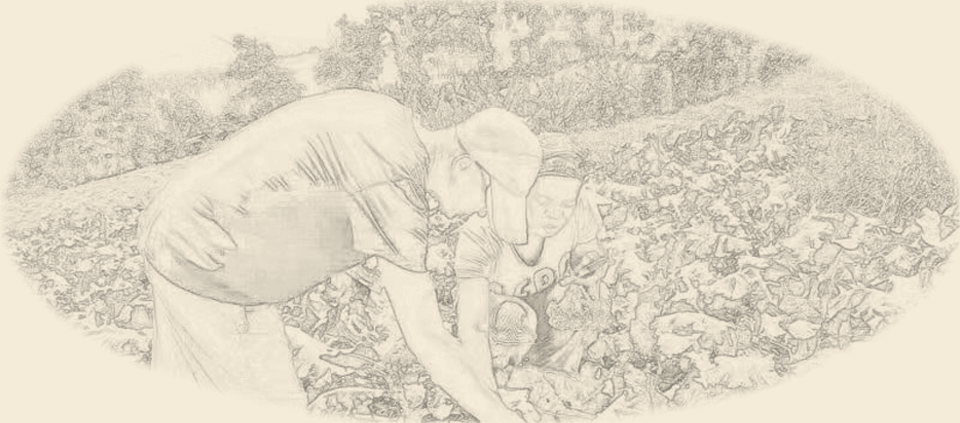
To resolve the problems in agricultural development, the government invited the China Xintian International Economic and Technical Cooperation Group to send its experts to set up the China-Dominica Modern Agricultural Center in the northernmost part of the country, in suburban Portsmouth. It is today the most advanced demonstration and training center in the Caribbean for researching new vegetable and fruit varieties and techniques to grow them. The center has introduced new varieties and advanced techniques so that the island can grow diverse fruits and vegetables on its own soil instead of having to import them. As a result, the prices of the once exorbitant vegetables have fallen sharply and can be now enjoyed by the average islander.
Developing Agriculture
The Chinese experts brought seeds, advanced techniques and modern agriculture concepts. Broccoli, cauliflower, cabbage, long eggplant, red cabbage, radish, celery and Hami melon were introduced from China to the local dining tables. "We used to import most of these, but now we grow them locally," a Dominican said proudly.
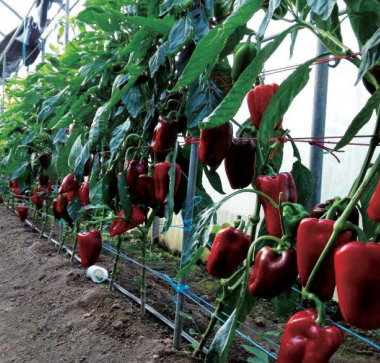
Color peppers introduced from China under cultivation
The locals today have a richer choice of vegetables and deeper pockets.
Tim, a local farmer, started growing Chinese bell pepper in a greenhouse under the guidance of the Chinese experts. After five months, he had produced 2,200 kg of the vegetable, worth ECD24,000 (USD8,880), nearly the average local salary for a year and a half. With further guidance, Tim had expanded to eight green houses, growing over 10 varieties of vegetables, which increased his income several times more.
Though agriculture is the pillar industry in Dominica, with agricultural income accounting for 16 percent of the GDP and agricul- tural export revenue about 50 percent of the country's total export earnings, in the past most of it was due to nature's bounty as fruits such as the banana, coconut, orange and mango grew naturally. Besides the naturally available species, there was a lack of diversity, particularly scarcity of vegetable production.
When the Chinese experts arrived, they found the local agriculture dependent on the vagaries of nature. However, if the local farmers could be made to understand the benefits of modern ecoagriculture and agro techniques, they could change their fate.
To change the farmers' habit of sowing the seeds and then leaving the rest to nature, the experts began to teach them advanced methods of pruning, weeding and fertilizing their land.
Sun Haojie, one of the Chinese experts, explained to a farmer called Jack why it was necessary to weed his field, but still he found the farmer's land overgrown with them.
"Why aren't you weeding your field?" Sun asked him.
"The weeds are small now and difficult to uproot," Jack replied. "Why not do it once and for all after they have grown?"
"You shouldn't do that. It will be too late by then. The weeds will eat up the nutrients meant for the crops if they are allowed to grow," Sun patiently explained to the farmer.
But Jack still hesitated and Sun felt the farmer hadn't quite bought his explanation.
Another Chinese expert, Hui Yonglu, had a similar experience. When he gave a talk on how to grow netted melon at the China-Dominica Modern Agricultural Center, though 20 farmers were supposed to attend each training session, Hui saw only four in his first class. When the class was over, one of them said to him, "I have never seen this type of melon before. Who knows whether it can be grown here or not! I just dropped in to listen to you."
When the harvest season came, Jack was dumbfounded – the lettuces in his field were only the size of a baseball, while those in his neighbor's field were as big as basketballs thanks to timely weeding. Cauliflowers, just 500 g in the past, weighed 1.5 kg. "From then on, I took the suggestions of the Chinese experts and now my lettuces too are the size of a basketball," Jack said.
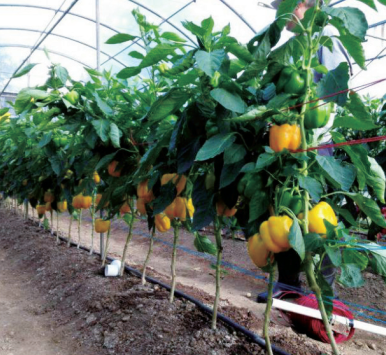
Color peppers introduced from China under cultivation
Hui changed his lectures into on-site training to let the farmers see the effect with their own eyes, which would draw them to his class. Today, a full report on Hui's netted melon cultivation training, complete with photographs, can be seen on the website of Dominica's Ministry of Agriculture. He is now regarded as a star by the local technical officials and farmers.
After changing the traditional agricultural concepts, it was time to increase the level of mechanization.
On their arrival in Dominica, the Chinese experts had introduced the agricultural machinery they had brought from home, sending them to the agricultural stations across the country. Huang Hongguang, a Chinese agricultural machinery expert, began to hold training sessions for operators selected from these stations, who were allowed to work there after passing the examination.
Once these agricultural stations had their own tractors and operators, they could serve as demonstration center pilots and provide services to the farmers in the neighborhood. To ensure the agricultural machinery operated smoothly, Huang toured across the country, teaching how to operate and maintain them so that there would be no equipment failure. Today, many tractor drivers are former apprentices of Huang, the busiest mentor.
Eco-Agriculture Replaces Traditional Method
The motto on Dominica's coat of arms reads, "Après Bondie C'est La Ter", that is, "After God the Earth". An island country formed by geothermal volcanic activity, Dominica has a small and vulnerable ecosystem. The Chinese experts' commitment to sustainable agricultural development therefore won the support of the local people.
The coordinator for Dominica's agricultural technical cooperation projects showed his approval for their work, saying, "The Chinese experts have helped to change the traditional concepts of farming among the locals, laying a solid foundation for the country's agricultural development."
Though Dominica has 365 rivers running through its over 700-sq-km territory, they were poorly utilized. Irrigation was still dependent on rainwater or tap water, which was expensive and insufficient, resulting in the vegetables and fruits withering in the dry eason. The Chinese experts built a small dam on the upstream area of the river that flew along the China-Dominica Modern Agricultural Center for water supply. It was the demonstration project for modern irrigation.
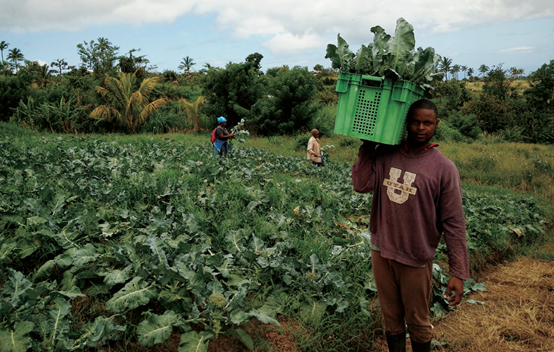
Reaping a bumper harvest
Its efficacy led to the construction of small dams by the medium- sized farms while an inexpensive drainage system consisting of bamboo pipes was introduced for small farms, greatly improving the utilization of water resources.
To control the use of chemical fertilizers, the Chinese experts encouraged the use of manure to improve the soil. However, it was hard to get manure as Dominica has only laying hens and a small number of captive breeding horses while most of the livestock is free-ranging. Therefore, the experts showed the farmers how to make straw manure with decomposed leaves, weeds and cornstalk when animal manure was not available.
The experts also shared practical tips according to the financial capacity of the farmers. Once Ding Yongsheng, the vice coordinator of the expert team, went to the pepper field of a farmer, Simon, to mentor him. Ding found the pepper leaves in the field eaten up by slugs. Knowing Simon couldn't afford pesticide for his big farm, Ding suggested spraying a circle of lime around the plants to keep the slugs off. Lime absorbs moisture and slugs lose their body fluid when they move over it, so they tend to keep off lime. Simon used the tip, got a bumper harvest of pepper and shared his secret with other farmers.
Getting Young Blood to Invigorate Agriculture
To invigorate Dominica's agriculture, it is not enough to just motivate the farmers; the younger generation including students needs to be involved.
Besides guiding the farmers, the Chinese experts have also introduced agricultural techniques such as dam-based irrigation, wet compost and modern agricultural concepts such as installation cultivation, soilless culture and automation control in popular science classes and school courses.
"The China-Dominica Modern Agricultural Center receives more than 1,000 visits from primary and middle school students every year to learn about modern farming. Farmers also bring their children to visit the center," Sun Haojie said. In addition, the center reaches out to the communities to popularize farming-related knowledge. In 2015 alone, Sun and his colleagues held over 20 sessions in primary and middle schools to teach the students about farming and show them how to grow vegetables.
The expert team also sends vegetables and fruits grown in the experimental field to local schools, hospitals, food banks and nursing homes. Due to the interactions, more and more young people in Dominica are now taking to farming. There is about a dozen young farmers' organizations across the country.
Jeffrey David, a young Dominican, studied and worked in the United States and Britain. He noticed the China-Dominica agriculture technical cooperation project on his journey home from abroad.After learning more about it, he left his job abroad and took up farming. In 2016, guided by the Chinese experts, Jeffery began to grow vegetables and the next year, had built three greenhouses.
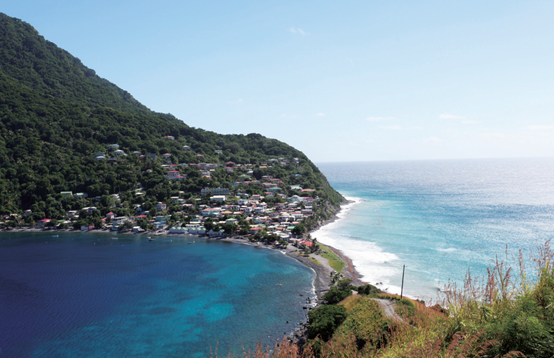
Seaside scenery of Dominica
After more than a decade of hard work, the Chinese experts have successfully popularized 28 new agro techniques in Dominica such as growing seedlings in greenhouses, soilless culture and biological pest control.
The Dominican government conferred its "Outstanding Achievement Award" on the Chinese agricultural expert team, commending their contribution to improving agro techniques in the country and developing agriculture.
In June 2019, Dominican President Charles Angelo Savarin visited the China-Dominica Modern Agricultural Center with the First Lady, Clara Josephine, and inspected phase 7 of the project. In the intelligent greenhouse nurturing thousands of banana, orange,tangerine and other seedlings, he saw Chinese experts showing middle school students how to cultivate vegetable seedlings. "Your work is very important to Dominica," he told them. "I appreciate the Chinese government sending us such an excellent experts' team to help us."
Today, the Chinese experts' reputation is growing among the Caribbean countries. Some of them have sent delegations to Dominica to learn about the China-Dominica agro technical cooperation.
Working in Dominica has some challenges. The low altitude and intense sunlight have a scorching effect, turning even the purple eggplants brown. Working outdoors in the scorching heat, the Chinese experts suffered sunburns that left their skins peeling. The Dominicans speak heavily accented English mixed with local dialects, and the farmers' language is even harder to understand. But over the years, the experts working in the fields have grown to understand the local language remarkably well and even speak English with the same accent.
Sun Haojie has been working in Dominica for 13 years. Once, when he was sent to a neighboring country, the taxi driver there asked him, "Are you from Dominica?" Sun was surprised. "Yes, but how did you know?" The driver laughed. "I knew it from your accent. I'm from there too."
FOR MORE
Project Overview
The China-Dominica agro technical cooperation project is a public wellbeing project sponsored by the Chinese government and undertaken by the China Xintian International Economic and Technical Cooperation Group. So far, six phases of the project have been completed. Agricultural experts from both countries have worked closely, explored constantly and made scientific plans to lay a solid foundation for quality development of agriculture on the island. The local agro techniques have been improved and agricultural products enriched. Trials to introduce over 60 new varieties of fruits and vegetables have been successful, following which some of the varieties are being cultivated on a large scale and sold on the market.
Phase 7 of the China-Dominica agro technical cooperation project was launched in May 2018, after the island was hit by Hurricane Maria on September 22, 2017. Since then, 300,000 quality seedlings have been cultivated, and over a dozen demonstration trials for vegetables, flowers and fruit trees conducted. Agro techniques have been demonstrated to repair agricultural facilities and soilless culture and cuttage have been undertaken. All in all, 28 technical training sessions have been conducted, and 179 tracking technique introduction and promotion tours have been made. Over 40 farm machinery maintenance services have also been conducted. All of this has been popular with the local farmers.
Dominican President Charles Angelo Savarin and First Lady Clara Josephine, Prime Minister Roosevelt Skerrit, Deputy Prime Minister Reginald Austrie, who is also the Minister for Housing, Lands and Water Resource Management, and Francine Baron, former Minister of Foreign and CARIOM Affairs, have all visited the project and spoken highly of it.


